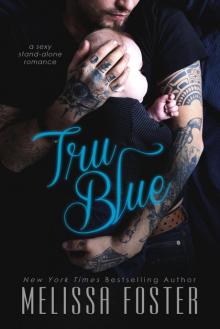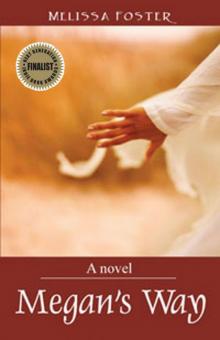- Home
- Melissa Foster
Chasing Amanda Page 6
Chasing Amanda Read online
Page 6
“Yeah,” she called back, laughing, “you know how that works. I’ll hide them from myself, then spend every two minutes jumping up to get one, as if there’s a spring on my butt, until the entire bag is gone.” She stuffed the candies in her desk drawer and locked it. “Thank you!” she called out.
Molly spent hours researching “ground-emitting heat” on the internet, to no avail. She had skipped dinner, asked Cole to fend for himself because of her ankle, a convenient excuse, and had Cole take their dogs for their nightly walk. She had dismissed the call from her mother, and once again put off calling Erik. Frustration brewed within her—there didn’t seem to be any plausible reason for the phenomenon. She read about the greenhouse effect, heat flux, man and nature, physical geography as modified by human action, and several other topics that a week before she couldn’t have cared less about.
She spun around on her chair and decided to take a different angle. She accessed the library resources, which made the old microfiche archives seem like the dark ages—a skill she learned from her technological-virgin of a husband, who had learned it from his library specialist at work. She searched “Kate Plummer” and immediately found several sites referencing the little girl’s disappearance. She scanned through as many as she was able before fatigue set in. The only new information she gained was that the investigation had ended shortly after Rodney Lett had been killed.
Molly leaned back in her chair, listening to the sounds of the television filter in from the family room. She sat up suddenly, disliking herself as she turned back to her laptop and googled “Hannah Slate”. Nine pages of data were found. The new search renewed her energy, and she scanned the materials until finally finding something relevant to the Hannah Slate she knew. A local Gazette article in the Community News and Events section recognized her for her many contributions to the community regarding equestrian issues and lobbying efforts, and noted her twenty-plus years of employment at the Department of the Navy. It also noted her recovery from a hospital stay for “undisclosed trauma.” The article was from the same year as Hannah’s divorce. Molly recalled attending a prayer meeting, at the urging of Pastor Lett, when she had moved to Boyds. It was there that she had first met Hannah who’d been attending the prayer group since her divorce. Molly shuddered, remembering how she had wanted to run from that room, the religious overtone too strong for her at a time when she had been so angry at God.
Molly’s eyes grew tired, and she scolded herself for thinking that Hannah could have been involved in Tracey’s disappearance.
Molly shut down her computer and put the bag of watery peas into the freezer. She hobbled past Cole, asleep in the family room, and gingerly mounted the stairs. She crawled into bed and quickly fell asleep. She was awakened an hour later as Cole wrapped his warm body around hers like a cocoon. Her body settled against his, and she fell asleep, comforted by his embrace.
Nine
Molly woke with a start at dawn, covered in sweat and shaking all over. She sat upright in bed, took a deep cleansing breath, and tried to maintain the flow of air to her lungs, a sickeningly sweet syrupy taste swam in her mouth. As she’d done many times before, she leaned over and grabbed her notepad and pen from the wooden nightstand. She began quickly sketching the images as they flew through her mind: a dark cavernous hole, trails leading out of the hole and into other shadowy cavernous rooms, a wooden box the size of a crate of wine, sealed with nails. Just as Molly’s throat began to relax, her mind was assailed again, thrusting her body forward. Cole rolled away from Molly, unaware of her difficulty. The image of a shovel flashed before her and was blacked out by a thick mass of trees. As quickly as Molly was overwhelmed by the Knowing, it vanished, leaving her exhausted and energized at the same time. It had taken Molly thirty years to understand the difference between dreams and visions, thirty years to realize that looking out a window after a dream washed it away, leaving a mere shadow in her mind, while nothing could erase the images from her visions which lingered for days, taunting her and leaving her feeling adrift, helpless, and curious.
As her body began to wind down, she curled against Cole once again, causing him to stir. “I love you,” she whispered, as she often did when she was scared. He turned to hold her, as he often did when he knew she just needed to be held. Molly lay safe and warm, unable to sleep, and unable to swallow without tasting the sweet flavor of apple candy.
The sun began to rise just as Pastor Lett finished boarding the last window on the Perkinson House. This should keep the kid inside, Pastor Lett thought. Her arms ached from hammering during the cover of the cold night. Balancing herself on the ladder had become trickier as the morning had approached and the roof had become slick with dew. She maneuvered down the ladder, her mind drifting back to the previous evening. She had approached the cellar in the same careful manner, and she’d thought for sure that there had been another incident—her warnings perhaps were not sharp enough. Inside, she had found the kid curled up on the mattress, fast asleep. The kid must have been exhausted from all of the fighting the evening before. Pastor Lett had noticed the bruises on both wrists and arms, and her heart wrenched. She had explained the importance of heeding her warnings and avoiding danger. “They wouldn’t understand my need to take care of you, to protect you,” she had said. She had reached her hand out, but the kid hadn’t budged. The kid had just looked at her, unsure, scared. Pastor Lett had seen that look before, and she didn’t let it sway her duty then, any more than she did now. She had turned away and left the dark room, locked up, and had gone to work on the long, tedious job of sealing up the windows and adding locks to the outside of the doors.
With her tools neatly organized, she made her way, exhausted, down the overgrown knoll toward her car, thankful that she had decided to park at the enclave just before the bridge, where fishermen and families parked near the edge of the lake. She threw her sweater over her shoulder, her turtleneck just warm enough for the chilly morning air, and retrieved a handful of sunflower seeds, gnawing them into tiny bits. The last ten feet to her car seemed like a mile, the import of what she’d done weighed heavily on her heart. Exhausted, she leaned against the car and looked back toward the Perkinson House—no telltale chimney showed above the trees, no worn pathway snaked its way up the knoll from the lake. It was as if it didn’t exist, though she was thankful it did. She whispered, “God, forgive me for what I’ve done,” and headed home to escape the nightmare that had become her life.
A quick visit to the police station revealed that they had no suspects in Tracey’s disappearance. Even worse, they appeared to have no real clues, either. Though the officer at the desk gave Molly the usual line of not being able to give out pertinent details, as it might hinder the case, it was clear to her that the search was at a standstill.
Molly had also inquired about the previous disappearance of Kate Plummer, which she knew was pushing her luck, but that didn’t stop her. Most of the local law enforcement officials had not been around long enough to know about the Kate Plummer case; however, there was one detective who remembered the case and was willing to speak to Molly.
A short, plump man ambled toward Molly, his hand outstretched, “Officer Brown,” he said, as if he were bored.
Molly couldn’t help but see a resemblance between Officer Brown and the Pillsbury doughboy, minus the cheery attitude. She swallowed her chuckle and said, professionally, “Molly Tanner, President of the Boyds Civic Association. There’s been talk around the community? Residents are trying to draw correlations between Tracey Porter’s disappearance and the disappearance of Kate Plummer. I was hoping you could shed some light for me, help me calm their fears.”
Officer Brown rolled his eyes and motioned for Molly to follow him. He led her down a stale gray and pale green corridor, turning back to look at Molly every few steps. They entered a small room with a square metal table, no bigger than a desk one might find in a cubicle, and two metal chairs. Molly was mildly surprised to see what she was sure was a ste
reotypical two-way mirror in the center of the far wall. Officer Brown motioned for Molly to sit down. He must have read Molly’s mind, because at that moment he said, “This is our interrogation room.” He motioned with his chubby hands around the small enclosure. “It all happens here: confessions, lies, manipulations.” His round face was a strange mix of excitement and weariness. His pink cheeks overlapped the sides of his mouth, and he breathed hard from the long walk down the corridor. His brown hair was matted on the top of his head, like a schoolboy with a bad case of hat head. His arms rested on his protruding belly, and he acted as if he thought he should be abrupt but couldn’t quite pull it off.
“Thank you for taking the time to speak with me,” Molly rested her arms on the table and smiled. “I’m sure there’s probably no link here, but I’ve only just learned about Kate…and Rodney Lett, and, well, the cases seem similar. You can see why the residents are talking. I was hoping you could fill me in so I can waylay their fears.”
Molly expected him to give her the song and dance of not being able to reveal details of the case, but he surprised her, “Well, let’s see.” He looked at the ceiling, thinking. “That was about twenty years ago, if I remember correctly.” He pursed his lips, as if he were trying to figure out the details in his mind. “Odd boy, he was. A man, really, but with a boy’s mind.”
“That’s what I’ve heard, sort of,” she offered.
“He wasn’t retarded, not that we could tell anyway. It seemed he was just slow. He would talk slow, move slow, he even thought slow, taking sometimes ten minutes before he would answer questions, but when he answered, he was, or he seemed, one hundred percent certain of his answers.”
“Did anyone in the community have trouble with him before Kate Plummer went missing?” Molly asked.
“No, no, not really.” As he shook his head, his chin jiggled. “Never heard much about the boy.” Detective Brown looked thoughtful. “It wasn’t till the Plummer case that we had any trouble with him.” He looked away, then back at Molly, “But then again, they never do appear dangerous, now, do they?”
Molly shrugged noncommittally.
Officer Brown continued, “But he knew the details about little Kate Plummer, that’s for sure.”
“Do you think he heard someone else talking about it, or that there could have been some other explanation?” she asked.
He gave her a stunned look. “He did it. He took that little girl and killed her.” He stared at Molly until she became uncomfortable and looked down.
Molly bristled at the coldness of his words, and began to feel sick to her stomach. The body of six-year-old Amanda—
“Pastor Lett,” he let out a little laugh, “she was really something. She kept insisting that Rodney had some sort of sixth sense.”
The hair on the back of Molly’s neck stood on end. She gathered her courage and reminded herself that Amanda was not Tracey. “Sixth sense?” she asked.
“I don’t know. It sounded like a load of horse manure to me. You know, the older sister trying to save the younger brother type of thing.” He looked around the room, fidgeted as if he were getting tired of the conversation. He leaned back in his chair, which Molly was sure would send him flying backwards, but it didn’t, and said, “The guy didn’t really have an alibi, either, if I remember correctly. I think he said he was at home when Kate was taken. I don’t remember anyone being able to corroborate that story for him.” He sighed heavily, “People came to fear him very quickly.”
Molly readjusted her position, feeling as though she wanted to run out of the room, cover her ears, and forget the whole thing, but Officer Brown’s voice reeled her back in.
“Pastor Lett found him that night and took his body to Delaware before we could even file a formal report. Said she was too upset to wait for the medical examiner to come by. Said she couldn’t take all of the red tape anymore.” He leaned forward in his chair, resting his elbows on the edge of the table. “She was gone within minutes of the phone call to the police, far as we could tell. She called later that evening, saying they were burying her brother the next morning and apologizing for taking off so quickly.”
“She must have been upset, but isn’t there some protocol for such an event? I mean if he was killed, then wasn’t there a murder investigation?” Molly asked.
“Yes, indeedy, there was. We searched the house, dusted for prints and all, and came up with nothing more than a broken window in the rear, which is how we think the murderers got in. We found boot prints in the house, several, in fact. Farm boots, the type that all the men in these parts wear. There were no solid leads. It sort of died out. In fact, people were happy to have closure at that point, and the Wilmington Police Chief followed up with the Lett family on their end.”
“But, Kate, what happened to her?” she spoke quickly, wanting answers faster than he could give them.
“Well, we continued the search for her. Took his clues, in fact, of a dark cold place. We searched the woods, crevices at Sugarloaf Mountain, trails, and boroughs. We found nothing at all. After a few weeks, we all assumed she was gone—dead, I mean—and that he had disposed of her. The case on Kate Plummer is closed, although the file will remain open until her body is found—if it’s ever found.”
“But—”
Officer Brown stood abruptly, “Mrs. Tanner, you just tell the residents that there’s no connection between the two cases. Rodney Lett is dead and buried.”
Molly knew when she’d been dismissed.
The bell above the door chimed as Molly entered the Country Store, and she shouted out her usual, “Hey, Jin!” and limped toward the coolers. Jin didn’t answer. Molly looked around the small store, four aisles of household necessities and snacks, but no Jin. She walked toward the rear of the store and called out again, “Jin?” He and his wife, Edie, had owned the store for twenty-five years, and Molly had yet to find the store attended by someone other than Jin or Edie. Molly admired his level of responsibility but in no way wanted to mimic it. She was happy that Cole was home with her at night, and even happier that he had been home with Erik when he was little.
The silence of the store pressed in on her. She grabbed a bottle of water and a Power Bar and was about to call out for Jin again when she heard hushed voices coming from the storeroom. Molly’s heart quickened. The store was an easy target for robbery, with the glass of the store covered with banners advertising beer and wine, and the old push-button style cash register. Everyone in town knew that Jin had no security or alarm system—he didn’t believe in them.
Molly stood near the storeroom door, “Jin, are you okay?”
“Be right out,” Jin said, hurriedly. His Korean accent was as strong as ever. Molly heard Edie say something in Korean, and relief washed through her. Jin’s voice became loud and harsh. Molly turned to walk toward the cash register as Jin opened the door, carrying a towel in his right hand. His pants hung off of his slim waist, and his thick black hair was cropped short and combed neatly to the side. “I ring you up,” he said impatiently.
“Is Edie…alright?” Molly asked.
“Oh yes. She upset, that’s all,” he walked behind the counter. “The little girl that is missing, she worried about her,” he said.
Molly was relieved by the simple, appropriate concern. “Do you know the family?” she asked.
“No, no. I see the girl before,” he was calm and thoughtful, “but I did not know her family.”
Molly paid for her purchase, began to leave, then hesitated, “Jin, did you know Pastor Lett’s brother, Rodney?”
Jin looked up and away, saddened. “Ah, yes,” he said. “I know Rodney.” He busied himself straightening up shelves that lined the wall behind the counter. “Poor Rodney. He no kill that girl.” He looked at Molly and held her gaze.
The comment took Molly by surprise. “I’m sorry…about him. How well did you know him?” she asked.
“He come here. All the time he come here. While his sister was at work, he walked her
e,” Jin pointed in the direction of the train tracks, and looked toward the back of the store, as if a memory were weaving its way into his mind. “He used to come, talk. He was very, very smart.” The “r” in “smart” came across as an additional short “a”.
“Really?” Molly said, happy to have been told something positive about Rodney, for whom, for some odd reason, she felt horribly sorry. “Tell me about him,” she put her bag on the counter.
“He smart. He knew things,” Jin pointed to his temple and tapped it a few times with his index finger. “He had feelings about things—good and bad—present, future.” Jin looked down at the floor, “That’s what got him in trouble.”
“Yeah, so I’ve heard,” Molly said.
“People around here,” Jin made a guttural sound of disgust, “they so quick to judge. They no like being scared.” He looked into Molly’s eyes, “They take things into their own hands,” he shook his head, “shame.”
Molly grabbed the paper bag containing her water and Power Bar, and turned toward a noise in the back of the store. Edie stood in her long black and gold caftan which dwarfed her small frame. She turned red-rimmed eyes to Jin with a mixed look of anger, hurt, and disbelief—as if she had walked in on Jin in bed with another woman.
“Hi, Edie!” Molly said cheerily, trying to ease the tension that had settled in the small store. “I was just asking Jin about Rodney Lett.”
“I know,” she said sullenly. She spoke Korean to Jin through clenched teeth. Jin did not respond.
“Do you think he took that little girl, Kate Plummer?” Molly asked, turning to Edie.
Edie shook her head and moved behind the counter to Jin’s side. She stood with her body half-hidden behind Jin’s, as if seeking his protection.

 Sweet, Sexy Heart – the Bradens & Montgomerys (Pleasant Hill – Oak Falls)
Sweet, Sexy Heart – the Bradens & Montgomerys (Pleasant Hill – Oak Falls) Trails of Love
Trails of Love Making You Mine – the Bradens & Montgomerys (Pleasant Hill – Oak Falls)
Making You Mine – the Bradens & Montgomerys (Pleasant Hill – Oak Falls) Wild, Crazy Hearts
Wild, Crazy Hearts The Gritty Truth
The Gritty Truth In for a Penny
In for a Penny Seaside Serenade (Seaside Summers Book 9)
Seaside Serenade (Seaside Summers Book 9) Making You Mine: Knox and Aubrey (The Bradens & Montgomerys (Pleasant Hill - Oak Falls) Book 5)
Making You Mine: Knox and Aubrey (The Bradens & Montgomerys (Pleasant Hill - Oak Falls) Book 5) Bayside Romance (Bayside Summers Book 5)
Bayside Romance (Bayside Summers Book 5) Maybe We Will (Silver Harbor)
Maybe We Will (Silver Harbor) A Very Braden Christmas
A Very Braden Christmas Bayside Fantasies (Bayside Summers Book 6)
Bayside Fantasies (Bayside Summers Book 6) Finding My Girl / Loving Talia (Love Like Ours Companion Booklet) (Sugar Lake Book 4)
Finding My Girl / Loving Talia (Love Like Ours Companion Booklet) (Sugar Lake Book 4) Tempted by Love: Jack Jock Steele (The Steeles at Silver Island Book 1)
Tempted by Love: Jack Jock Steele (The Steeles at Silver Island Book 1) Bayside Romance (Bayside Summers)
Bayside Romance (Bayside Summers) Seaside Serenade (A Seaside Flirt)
Seaside Serenade (A Seaside Flirt) Searching For Love – the Bradens & Montgomerys (Pleasant Hill – Oak Falls)
Searching For Love – the Bradens & Montgomerys (Pleasant Hill – Oak Falls) Searching for Love (The Bradens & Montgomerys (Pleasant Hill - Oak Falls) Book 6)
Searching for Love (The Bradens & Montgomerys (Pleasant Hill - Oak Falls) Book 6) Wild, Crazy Hearts – the Bradens & Montgomerys (Pleasant Hill – Oak Falls)
Wild, Crazy Hearts – the Bradens & Montgomerys (Pleasant Hill – Oak Falls) A Little Bit Wicked (The Wickeds
A Little Bit Wicked (The Wickeds Read, Write, Love (Love in Bloom: The Remingtons, Book 5) Contemporary Romance
Read, Write, Love (Love in Bloom: The Remingtons, Book 5) Contemporary Romance Flames of Love
Flames of Love Lovers at Heart
Lovers at Heart Slope of Love (Love in Bloom: The Remingtons)
Slope of Love (Love in Bloom: The Remingtons) Flirting with Love
Flirting with Love Chasing Amanda
Chasing Amanda Story of Love (Josh & Riley's Wedding Novella): Love in Bloom: The Bradens
Story of Love (Josh & Riley's Wedding Novella): Love in Bloom: The Bradens Bursting With Love
Bursting With Love Truly, Madly, Whiskey
Truly, Madly, Whiskey Logan
Logan Where Petals Fall
Where Petals Fall Bad Boys After Dark: Mick
Bad Boys After Dark: Mick Daring Her Love
Daring Her Love Rescued by Love (Love in Bloom: The Ryders): Jake Ryder
Rescued by Love (Love in Bloom: The Ryders): Jake Ryder Jackson
Jackson Discovering Delilah
Discovering Delilah Dreaming of Love
Dreaming of Love Love at Last
Love at Last Hearts at Play
Hearts at Play Whisper of Love (The Bradens at Peaceful Harbor, Book Five)
Whisper of Love (The Bradens at Peaceful Harbor, Book Five) Seaside Whispers: Matt Lacroux (Love in Bloom: Seaside Summers)
Seaside Whispers: Matt Lacroux (Love in Bloom: Seaside Summers) Only for You
Only for You Wicked Whiskey Love
Wicked Whiskey Love Destined for Love (Love in Bloom: The Bradens, Book 2) Contemporary Romance
Destined for Love (Love in Bloom: The Bradens, Book 2) Contemporary Romance Seaside Nights
Seaside Nights Lovers at Heart, Reimagined
Lovers at Heart, Reimagined Seaside Lovers: Grayson Lacroux (Love in Bloom: Seaside Summers)
Seaside Lovers: Grayson Lacroux (Love in Bloom: Seaside Summers) Love Like Ours (Sugar Lake Book 3)
Love Like Ours (Sugar Lake Book 3) Seaside Sunsets
Seaside Sunsets Tru Blue
Tru Blue Megan's Way
Megan's Way The Real Thing (Sugar Lake Book 1)
The Real Thing (Sugar Lake Book 1) Catching Cassidy
Catching Cassidy Anything For Love
Anything For Love Sisters in Bloom
Sisters in Bloom Romancing My Love (Love in Bloom: The Bradens) Contemporary Romance
Romancing My Love (Love in Bloom: The Bradens) Contemporary Romance Bayside Heat
Bayside Heat Bad Boys After Dark
Bad Boys After Dark Game of Love
Game of Love Mad About Moon
Mad About Moon Seaside Hearts (Love in Bloom: Seaside Summers, Book 2) Contemporary Romance
Seaside Hearts (Love in Bloom: Seaside Summers, Book 2) Contemporary Romance Come Back To Me
Come Back To Me Bayside Passions (Bayside Summers Book 2)
Bayside Passions (Bayside Summers Book 2) Seaside Dreams (Love in Bloom: Seaside Summers, Book One)
Seaside Dreams (Love in Bloom: Seaside Summers, Book One) Cape Cod Kisses
Cape Cod Kisses Thrill of Love
Thrill of Love Driving Whiskey Wild
Driving Whiskey Wild Swept Into Love: Gage Ryder (Love in Bloom: The Ryders Book 5)
Swept Into Love: Gage Ryder (Love in Bloom: The Ryders Book 5) Have No Shame
Have No Shame Bayside Desires (Bayside Summers Book 1)
Bayside Desires (Bayside Summers Book 1) Chased by Love (Love in Bloom: The Ryders): Trish Ryder
Chased by Love (Love in Bloom: The Ryders): Trish Ryder Crashing Into Love
Crashing Into Love Seized By Love
Seized By Love Sea of Love (Love in Bloom: The Bradens, Book 4) Contemporary Romance
Sea of Love (Love in Bloom: The Bradens, Book 4) Contemporary Romance Tempting Tristan
Tempting Tristan Call Her Mine
Call Her Mine Taming My Whiskey
Taming My Whiskey Surrender My Love (Love in Bloom: The Bradens): Cole Braden
Surrender My Love (Love in Bloom: The Bradens): Cole Braden Cape Cod Promises: Love on Rockwell Island
Cape Cod Promises: Love on Rockwell Island Seaside Secrets
Seaside Secrets Our New Love
Our New Love River of Love
River of Love Stroke of Love
Stroke of Love Taken by Love (Love in Bloom: The Bradens #7)
Taken by Love (Love in Bloom: The Bradens #7) Friendship on Fire (Love in Bloom: The Bradens, Book 3) Contemporary Romance
Friendship on Fire (Love in Bloom: The Bradens, Book 3) Contemporary Romance Healed by Love (Love in Bloom: The Bradens)
Healed by Love (Love in Bloom: The Bradens) Bad Boys After Dark: Carson (Bad Billionaires After Dark Book 3)
Bad Boys After Dark: Carson (Bad Billionaires After Dark Book 3) Sisters in White
Sisters in White Fated for Love
Fated for Love Only for You (Sugar Lake Book 2)
Only for You (Sugar Lake Book 2) Embracing Her Heart
Embracing Her Heart Bad Boys After Dark: Dylan (Bad Billionaires After Dark Book 2)
Bad Boys After Dark: Dylan (Bad Billionaires After Dark Book 2) Crushing on Love (The Bradens of Peaceful Harbor, Book Four)
Crushing on Love (The Bradens of Peaceful Harbor, Book Four) Seaside Embrace (Love in Bloom
Seaside Embrace (Love in Bloom Claimed by Love (Love in Bloom: The Ryders, Book 2): Duke Ryder
Claimed by Love (Love in Bloom: The Ryders, Book 2): Duke Ryder Lovers at Heart, Reimagined (The Bradens)
Lovers at Heart, Reimagined (The Bradens) Bayside Heat (Bayside Summers Book 3)
Bayside Heat (Bayside Summers Book 3) Wild Boys - Heath
Wild Boys - Heath Seaside Dreams (Love in Bloom: Seaside Summers, Book One) Contemporary Romance
Seaside Dreams (Love in Bloom: Seaside Summers, Book One) Contemporary Romance